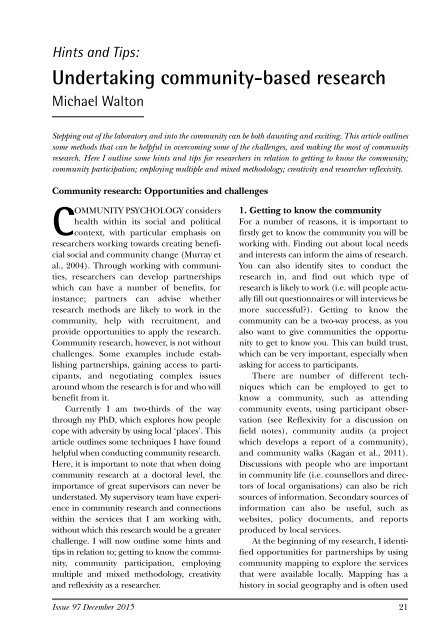Social Psychology Special Issue
PsyPAG-Quarterly-Issue-973
PsyPAG-Quarterly-Issue-973
You also want an ePaper? Increase the reach of your titles
YUMPU automatically turns print PDFs into web optimized ePapers that Google loves.
Hints and Tips:<br />
Undertaking community-based research<br />
Michael Walton<br />
Stepping out of the laboratory and into the community can be both daunting and exciting. This article outlines<br />
some methods that can be helpful in overcoming some of the challenges, and making the most of community<br />
research. Here I outline some hints and tips for researchers in relation to getting to know the community;<br />
community participation; employing multiple and mixed methodology; creativity and researcher reflexivity.<br />
Community research: Opportunities and challenges<br />
COMMUNITY PSYCHOLOGY considers<br />
health within its social and political<br />
context, with particular emphasis on<br />
researchers working towards creating beneficial<br />
social and community change (Murray et<br />
al., 2004). Through working with communities,<br />
researchers can develop partnerships<br />
which can have a number of benefits, for<br />
instance; partners can advise whether<br />
research methods are likely to work in the<br />
community, help with recruitment, and<br />
provide opportunities to apply the research.<br />
Community research, however, is not without<br />
challenges. Some examples include establishing<br />
partnerships, gaining access to participants,<br />
and negotiating complex issues<br />
around whom the research is for and who will<br />
benefit from it.<br />
Currently I am two-thirds of the way<br />
through my PhD, which explores how people<br />
cope with adversity by using local ‘places’. This<br />
article outlines some techniques I have found<br />
helpful when conducting community research.<br />
Here, it is important to note that when doing<br />
community research at a doctoral level, the<br />
importance of great supervisors can never be<br />
understated. My supervisory team have experience<br />
in community research and connections<br />
within the services that I am working with,<br />
without which this research would be a greater<br />
challenge. I will now outline some hints and<br />
tips in relation to; getting to know the community,<br />
community participation, employing<br />
multiple and mixed methodology, creativity<br />
and reflexivity as a researcher.<br />
1. Getting to know the community<br />
For a number of reasons, it is important to<br />
firstly get to know the community you will be<br />
working with. Finding out about local needs<br />
and interests can inform the aims of research.<br />
You can also identify sites to conduct the<br />
research in, and find out which type of<br />
research is likely to work (i.e. will people actually<br />
fill out questionnaires or will interviews be<br />
more successful?). Getting to know the<br />
community can be a two-way process, as you<br />
also want to give communities the opportunity<br />
to get to know you. This can build trust,<br />
which can be very important, especially when<br />
asking for access to participants.<br />
There are number of different techniques<br />
which can be employed to get to<br />
know a community, such as attending<br />
community events, using participant observation<br />
(see Reflexivity for a discussion on<br />
field notes), community audits (a project<br />
which develops a report of a community),<br />
and community walks (Kagan et al., 2011).<br />
Discussions with people who are important<br />
in community life (i.e. counsellors and directors<br />
of local organisations) can also be rich<br />
sources of information. Secondary sources of<br />
information can also be useful, such as<br />
websites, policy documents, and reports<br />
produced by local services.<br />
At the beginning of my research, I identified<br />
opportunities for partnerships by using<br />
community mapping to explore the services<br />
that were available locally. Mapping has a<br />
history in social geography and is often used<br />
<strong>Issue</strong> 97 December 2015 21


